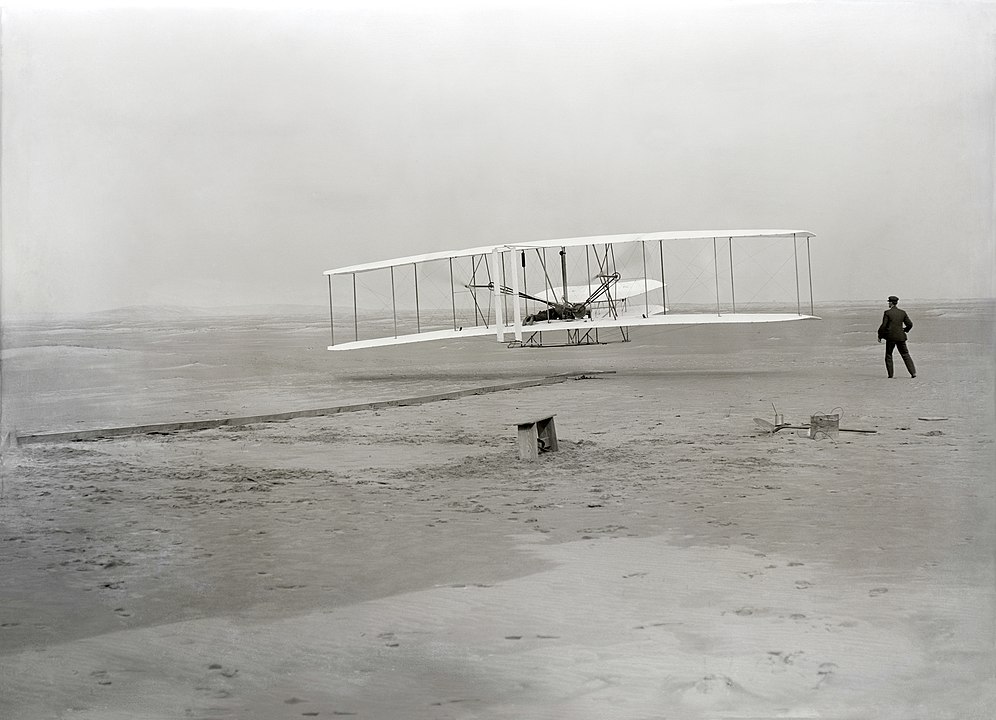
Why were the Wright brothers able to fly in 1903? Because they employed a very methodical and scientific method and because of technological advances.
On December 17th, 1903, at 10:35, Orville Wright flew the Wright Flyer for 12 seconds and covered 37 meters. It was the first ever powered flight. They flew three more times that day and the last flight covered 259 meters in 59 seconds. Unfortunately, their plane crashed, and they would have to build a new one, but they had already learned a lot.
So, why were the Wright brothers finally able to fly on that day? What happened? Well, it wasn’t so much what happened on that day, but what happened on all the days leading up to that day. Both for them and for research into flight. There were several reasons why they finally succeeded: their upbringing, previous research into aviation, their way of thinking, their experimental method, and improvements in technology.
Their upbringing. Wilbur and Orville Wright were born in 1867 and 1871 respectively. Their father was a bishop who believed deeply in curiosity, knowledge, education, and pursuing projects for the joy of the project alone. Their mother had studied math and science at college. The boys were encouraged to seek out answers to their questions from an early age.
They were able to build on previous research into aviation. The Wright Brothers obviously weren’t the first people to fly. On 19th October 1783, the Montgolfier brothers carried out the first manned-hot air balloon flight. The first airship was flown in 1852. It had an engine and was controllable. This was technically the first powered flight, although airships are not heavier than air flight. They will stay in the air even if their engine breaks.
The first heavier than air flying machines were designed in the 17th century, but it wasn’t until Sir George Cayley in 1846 that the physics of lift were understood. He was able to construct a glider that could carry a boy. Through the end of the 19th century and into the start of the 20th, a number of people took up the challenge. Growing up, the Wright Brothers were able to study all of this knowledge and follow the experiments. They learned about the principles of flight, they learned about wing shapes, and they learned how a glider could be controlled. Wilbur Wright wrote letters to the Smithsonian Institution asking for all of the information on aerodynamics that they had.
Their way of thinking was vital. The Wright Brothers became involved with research into flight because they loved the challenge and they wanted to find a solution to one of the most difficult problems of the time. They were not in it for fame, glory, or money. They were also the only people to realize that there were three problems to flight: the wings, the method of controlling the aircraft, and the engine. They knew that all three of these things had to be solved before a plane would fly. Many of the other people who were attempting to fly only looked at one or two of these issues and failed. Some people thought that air currents were too fast for human reflexes and a plane needed to be completely stable because no human would be able to control it. The Wright brothers realized that the pilot would be an integral part of the plane, and nothing would fly without a pilot being able to control it. The Wright brothers also knew that they had to solve all of their problems themselves and build any parts that they needed themselves. They had no sponsorship and no support. They had to bear all of the financial burden themselves. Without an incredibly strong desire to keep going, they may have given up long before they succeeded.
They had an experimental method that was exemplary. The Wrights were fascinated by what they were doing, and they lived for the data. They wrote down everything that they did. For example, when they discovered that the wind tunnel data from the Smithsonian Institution was incorrect, they built their own wind tunnel and made their own data. They built gliders and they tested them again and again, making slight changes to the wings each time. They made a rudder and a way of warping the wings to steer the plane. They performed thousands of glider flights, meticulously noting down all of their data so that they would know what worked and what didn’t.
Improvements in technology may have helped more than anything else. The Wright Flyer carried a 91 kg, 4 cylinder, 12 horsepower engine when it made its first flight. This engine was entirely built by Wilber, Orville, and Charlie Taylor, a mechanic at their bicycle shop. This was testament to their ability to solve problems, but it is also a big reason why they were able to fly when so many others hadn’t been. The gasoline engine had been invented in 1876. Before that, people had been trying to make planes using steam powered engines, but they were far too heavy. If Carl Benz hadn’t invented the gasoline engine, the Wright brothers might not have flown when they did. Secondly, their engine had an aluminium block. Aluminium had been produced in 1845, but it was soft, weak, and very expensive. It was only in the 1890s that a way of making stronger aluminium had been discovered and the price had fallen low enough for the Wrights to buy it. Without those advances, they might not have been able to manufacture an engine that was light enough for their plane.
So, why were the Wright brothers able to fly in 1903? Because of the way that they approached the problem, because of the kind of people that they were, and because technology had improved to a sufficient level. And this is what I learned today.
https://www.nps.gov/wrbr/learn/historyculture/thefirstflight.htm
https://en.wikipedia.org/wiki/Wright_brothers
https://airandspace.si.edu/exhibitions/wright-brothers/online/fly/1899/fundamentals.cfm
https://thebeckert3group.com/two-wright-brothers-three-reasons-for-success-teamwork-tone-tenacity/
https://www.history.com/topics/inventions/wright-brothers
https://www.npr.org/2003/10/19/1469463/the-race-for-flight
https://www.intellectualventures.com/buzz/insights/failing-for-success-the-wright-brothers
https://www.britannica.com/topic/Wright-glider-of-1902
https://en.wikipedia.org/wiki/History_of_aviation
https://www.wright-brothers.org/Information_Desk/Just_the_Facts/Engines_&_Props/1903_Engine.htm
https://en.wikipedia.org/wiki/History_of_aluminium
